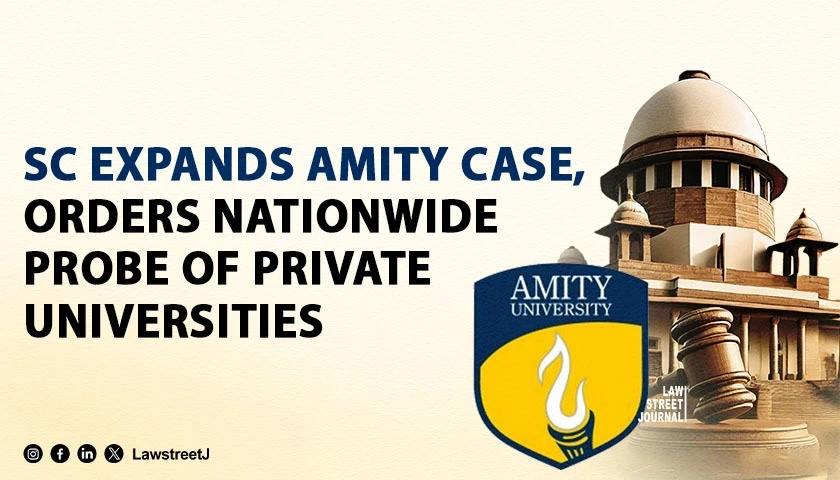New Delhi: The Supreme Court of India has issued sweeping directions for a detailed examination of all private universities in the country, ordering the Government of India, all State Governments, Union Territories, and the University Grants Commission (UGC) to disclose complete information about the establishment, functioning, and regulation of these institutions.
Justices Ahsanuddin Amanullah and N.V. Anjaria, hearing a writ petition filed by Ayesha Jain against Amity University, Noida, expanded the scope of inquiry to cover systemic issues affecting private higher education across India, stating that it was necessary “in the larger public interest.”
The Court was hearing Writ Petition (Civil) No. 531/2025 when it took this suo motu step after detailed deliberations. The bench noted, “Since the issues have now come before this Court, which the present coram has also deliberated in detail, in the larger public interest, it is deemed appropriate to examine the aspects relating to the creation/establishment/setting-up of all private Universities, either under the State Governments/Union Territories or the Central Government, and connected concerns.”
The Court issued comprehensive directions requiring governments to disclose extensive information. The bench ordered:
“This Court would like to have details from the Government(s) as to the background/circumstances and under which provisions of law all private/non-government/deemed-to-be Universities came into being and further, what benefits the Government has granted to them, including the stipulations and conditions under which such benefits, both in terms of allotment of land, preferential treatment of any kind, and/or other ancillary benefits, were conferred upon them.”
The Court mandated disclosure of organizational structures, stating:
“The Government(s) shall also furnish details of the memorandum of articles and aims and objectives of the societies/organizations and persons who are actually running/managing/in control of the said bodies/Universities, whether through an apex body/Managing Committee/Board of Governors—i.e., by whatever nomenclature the top decision-making body is known—as also their composition and mode of selection to such bodies which run the institutions.”
Regarding the UGC’s role, the Court directed:
“The Court would require the University Grants Commission to disclose its role vis-à-vis such institutions on oath. It is made clear that the affidavit by the UGC shall cover what the statute/policy mandates as also the actual mechanism to monitor/oversee compliance by the institutions.”
The Court specified that disclosures must cover “the policy of admission of students, the process of recruitment of academic staff adopted by such Universities, and the regulatory checks that the Government(s) have put in place to ensure that the terms and conditions enjoined upon such institutions—either by way of statute, policy, or otherwise—are duly adhered to.”
Addressing the critical issue of financial operations, the Court asked:
“Whether such institutions, or at least those of them that claim to, are functioning on the stated/advertised ‘no profit, no loss’ basis? How and under what authority have the Government(s) enforced this and ensured no diversion of monies towards anything unconnected with the educational institution, including salaries/expenses towards founders/family members and assets acquired by them?”
The Court also sought information on grievance redressal mechanisms, asking for details about “grievance redressal mechanisms in place, both for students as also faculty/staff” and “whether such institutions are paying the minimum salaries to faculty and staff, as mandated by law.”
The bench directed that responsibility for compliance be placed at the highest levels:
“The Cabinet Secretary to the Government of India and all Chief Secretaries to the State Governments/Union Territory Administrations shall obtain and collate the information described supra from all concerned Ministries/Departments functioning under their jurisdiction and file affidavits personally affirmed by them. The Chairman, UGC, will act likewise. There shall not be any delegation of such filings.”
The Court emphasized accountability, stating:
“Further, responsibility for every disclosure and its correctness shall rest with the deponent(s) concerned.”
In a stern warning, the Court cautioned:
“If there is any attempt to withhold/suppress/misrepresent/mis-state facts in the affidavits called for, this Court will be compelled to adopt a strict view.”
The Court accordingly added the Government of India through the Cabinet Secretary, all States and Union Territories (including the National Capital Territory of Delhi) through their Chief Secretaries, and the UGC through its Chairman as party-respondents.
The matter has been listed for hearing on January 8, 2026 at 3:00 PM as part-heard. For the present, the personal appearances of the President, Ritnand Balved Education Foundation, and the Vice-Chancellor, Amity University, have been dispensed with.
Case Title: Ayesha Jain vs. Amity University, Noida & Ors.













